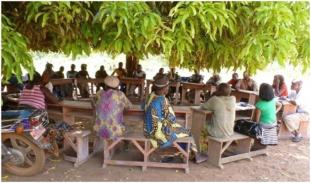- English
- Français
- Português
ACi Success Story: ACi Farmer Training Increases Income for Beninese Cashew Farmers
An ordinary working day of the Beninese farmer starts with an early morning walk of about two hours before reaching the four hectare cashew farm he has owned for more than 20 years. It is harvesting season at the moment, which means his daily activities consist of collecting the ripe cashew apples, separating the nut from the apple and drying the raw cashew nuts (RCN) to ensure good quality. During the harvesting season the farmer mainly consumes the harvested cashew apples instead of bringing meals to the farm. This saves him money and food resources.
 A lively discussion among Beninese farmers on cashew production
ACi has conducted research among 240 cashew farmers in Benin through individual interviews and group discussions. The research determined the success factors of ACi farmer trainings with a focus on the link between increased farmer income from cashew production and household food security. Usi, a cashew farmer from Agbassa Kpa, a small community north of Djidia, was part of the first group of ACi trained farmers in Benin and received trainings on farm management and Good Agricultural Practices for harvesting and post-harvesting for two and a half years.
A lively discussion among Beninese farmers on cashew production
ACi has conducted research among 240 cashew farmers in Benin through individual interviews and group discussions. The research determined the success factors of ACi farmer trainings with a focus on the link between increased farmer income from cashew production and household food security. Usi, a cashew farmer from Agbassa Kpa, a small community north of Djidia, was part of the first group of ACi trained farmers in Benin and received trainings on farm management and Good Agricultural Practices for harvesting and post-harvesting for two and a half years.
To ensure food security throughout the whole year, Usi now applies intercropping, whereby he grows yam, maize, and cowpea as well as vegetables such as okra, pepper and garden egg alongside his cashew trees. In order to get an additional source of income, Usi collects tree branches after pruning the farm for producing and selling charcoal. To increase the cashew yield, he uses grafted seedlings from nurseries when planting new trees, since they last longer and increase the quality of the raw cashew nut. In Benin, cashew farmers usually harvest 500kg per hectare. However, through the employment of the Good Agricultural Practices Usi has increased his yield from 500kg per hectare up to 680kg per hectare.
His involvement in bulk selling increases bargaining power and boosts the price he receives from selling RCN. Another advantage of collective selling is the regular meetings at the bulk selling stations, as they offer informal knowledge sharing among cashew growers in the community. Some of the money he earns from bulk selling is reinvested in labour to clear the land during the post-harvest season and to collect cashew nuts during the harvest season.
Apart from him and his wife, four external labourers work at the farm twice a week to keep labour costs low. After paying wages the farmer still holds enough money to distribute small loans to other cashew growers, who were not part of the ACi trainings. “Thank to ACi,” Usi said, “My income increased last year and I was able to keep my family fed and pay school fees for my children.”



